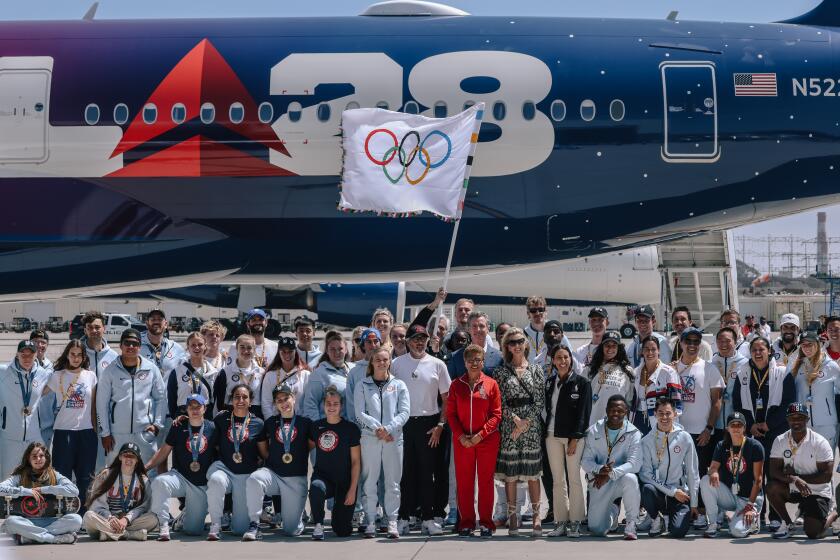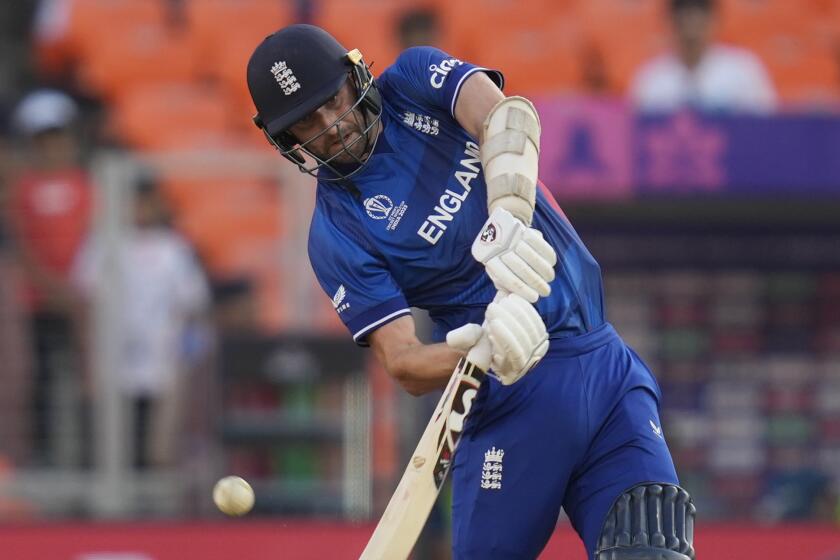L.A. Olympics boss Reynold Hoover uses wartime problem-solving skills to plan 2028 Games

- Share via
The man in charge of preparing Los Angeles for the 2028 Summer Olympics was never an elite athlete. Never even worked in sports before.
So when Reynold Hoover talks about his new role as chief executive for LA28, the private group responsible for staging the Games and the ensuing Paralympics, he often refers to his stint as a brigadier general in the Afghanistan war.
“The most complex logistics operation since World War II,” he says.
During a massive troop surge in 2010, Hoover scrambled to keep U.S. forces supplied. That meant finding ways to deliver 6 million meals, 2 million gallons of fuel and a million cases of bottled water to hundreds of bases and outposts — some reachable only by airdrop — each month.
LA28, the group organizing the 2028 Olympics in L.A., is focused on sharing what staff learned in Paris and negotiating contracts ahead of the Games.
The retired Army officer suggests that staging the world’s largest sports event isn’t so different.
“It’s all about planning, operations and logistics,” he says. “If you get those three things right, all the rest will fall into place.”
This autumn marks an inflection point for Olympic organizers as they transition from planning to the nuts-and-bolts of getting things done. Southern California has a big stake in their success, or lack thereof, over the next four years.
A botched Games could mean ticket errors and bumper-to-bumper traffic. If LA28 spends too much — or fails to generate enough in corporate sponsorships and other revenue — city and state taxpayers will be on the hook for hundreds of millions.
“Reynold is one of the few people in the nation who possesses the operational and logistics expertise that the Olympic and Paralympic Games require,” LA28 chairman Casey Wasserman says. “He’s been tasked with some of our nation’s most complex challenges.”

It was late 2009 when Hoover took charge of the Joint Sustainment Command-Afghanistan headquartered in Kandahar. A former explosive ordnance specialist who was awarded a Bronze Star during Operation Enduring Freedom, he had developed into a quiet but effective leader.
The unit he inherited required an overhaul to deal with thousands more incoming troops. Hoover quickly created a new management structure and gathered a core of officers experienced in various aspects of supply.
“He knows that he needs to surround himself with people who have expertise that he doesn’t,” says retired Brig. Gen. Skip O’Neil, one of his former officers. “He doesn’t have an ego about that.”
Their task was difficult and dangerous. As retired Col. Anthony Kyles recalls: “We were building cities in active combat zones.”
Hosting an Olympics and Paralympics, though not as complex or hazardous, nonetheless involves preparing dozens of stadiums and arenas, housing thousands of athletes and coordinating transportation throughout the region for a hectic two months. It also requires shepherding millions of fans.
L.A. wants a car-free Olympics but the $3.3 billion in transportation projects needed to make it happen are only 5% funded. Officials are looking to the next presidential administration for help.
Hoover accepted this challenge in June, replacing marketing veteran Kathy Carter as LA28’s chief executive. It wasn’t just his military experience — he retired as a lieutenant general — that got him hired.
There were also stints with the National Guard, Federal Emergency Management Agency, the CIA and the White House, where he served as a homeland security specialist under George W. Bush.
Borrowing from his Afghanistan playbook, Hoover has identified three priorities that begin with reorganizing LA28, creating separate departments for planning, operations and logistics. Nearly all of this work previously fell to just one man — longtime chief operating officer John Harper.
“That’s too much span of control,” Hoover says. “If you have the person who is supposed to focus on Games delivery worried about bedsheets in the Olympic village, then they’re not focused on the right thing.”
Still $1 billion short of their sponsorship goal, L.A. 2028 Olympic organizers are turning to Nike’s former leader of global marketing.
The second item on his to-do list involves continuing negotiations with the city of L.A., which will have to provide traffic control, garbage collection and other services at venues.
As a newcomer to Southern California, Hoover has made a point of meeting with City Council members in their districts as a way of hearing their thoughts and exploring his new home. “We go out for breakfast,” the Connecticut native says.
Councilwoman Monica Rodriguez has found him “earnest to learn of concerns raised by [council] members.” After a series of weekly talks and time spent together at the 2024 Paris Olympics, Mayor Karen Bass says she has come to believe “the experience he brings will be vital.”
The final piece of Hoover’s plan centers on interaction with community leaders and local organizations. After The Times wrote about beautifying L.A. with environmentally responsible landscaping, he contacted experts quoted in the article.
“We were pleasantly surprised,” says Katie Tilford, interim executive director for the Theodore Payne Foundation, a nonprofit nursery and education center for native California plant life.
Foundation leaders visited the LA28 offices to give a presentation on relandscaping at venues and other Olympic locations. “Every little patch of dirt can be a wildlife habitat,” Tilford says. “I wouldn’t say he made any promises but … we’ll be going back to them with more ideas.”
So far, Hoover’s outreach has not extended to NOlympics LA, an opposition group that describes LA28 as a “black box” operating outside public view. Worried about the potential for homeless encampment sweeps and an oppressive police presence during the Games, the group has taken note of Hoover’s background.
“We have a lot of concerns about the violence and terror that this man will bring to the people of L.A.,” NOlympics LA member Eric Sheehan says. “We’re concerned about what this signals to Angelenos.”
There have been other hiccups during the past five months. Pasadena recently approved a contract with LA28, joining Inglewood, Long Beach and other neighboring cities where venues will be located, but Santa Monica City Council members have balked at hosting beach volleyball. The decision to hold softball and canoe slalom in Oklahoma City, which has ideal facilities for those sports, has met with public pushback.
“We probably weren’t as transparent as we could have been,” Hoover says of the venue change, which occurred before his hiring. “As a result, you know, now we have to go back to the city [of L.A.] and explain to the city why it makes sense.”
Cricket, flag football, baseball and softball, lacrosse and squash are the five sports Los Angeles Olympic organizers hope to add for the 2028 Games.
A few months ago, during the Paris Games, Wasserman was the subject of a tabloid report that resulted in some outsiders suggesting he step down. Hoover describes the incident as a “bit of a distraction,” but insists “we’re continuing to stay focused on what we’re doing.”
The relationship between the chief executive and his chairman is noteworthy in that they are, in effect, splitting LA28’s principal workload.
While Hoover oversees day-to-day operations, Wasserman will continue taking the lead in generating revenue. The grandson of Hollywood mogul Lew Wasserman and owner of a prestigious talent agency, he is seen as critical to wooing benefactors and corporate sponsors.
“Look, he has his skill sets and I have mine,” Hoover says. “I think that’s why we make such a great pair.”
The fate of the 2028 Summer Games will depend on their every move during the next few years. As an unexpected choice for the job, Hoover understands that some people — both inside and outside the Olympic movement — will question his approach.
The former military officer is sticking to what he knows best.
It is a method tested “in the most austere, complex environments in which people are shooting at us and people are dying,” he says. “The model that I want, that I’m moving this organization toward, works.”
More to Read
Go beyond the scoreboard
Get the latest on L.A.'s teams in the daily Sports Report newsletter.
You may occasionally receive promotional content from the Los Angeles Times.











